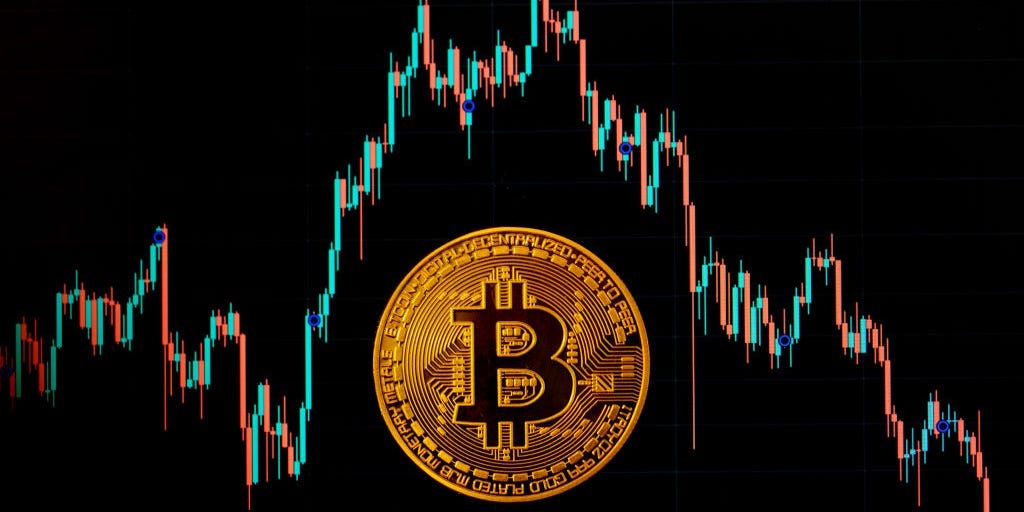Bitcoin is a wasteful asset that doesn’t add to global welfare, Dieter Wermuth, economist and partner at Wermuth Asset Management, wrote in a recent note. He says the bitcoin market is highly centralized, and primarily benefits early investors and miners. The tokens fail as currency, given their high volatility and lack of real-world use, according to Wermuth. Loading Something is loading.
Thanks for signing up!
Access your favorite topics in a personalized feed while you’re on the go.
Despite calls from crypto enthusiasts to HODL (hold on for dear life), letting go of bitcoin may be good for world prosperity, at least according to one economist.
That’s because the cryptocurrency is a wasteful investment that takes funds away from general economic growth, Dieter Wermuth — economist and partner at Wermuth Asset Management — wrote in a note published on Wednesday.
Not only does the speculative asset not contribute to broader welfare, it creates social inequalities and allows for money laundering, tax evasion and major climate deterioration, Wermuth said.
“Bitcoin activities are a negative-sum game,” he wrote. “Without crypto, the economy would be better off — there would be more money for consumption and investment.”
Detailed below are three reasons to support Wermuth’s negative assertions about bitcoin.
(1) It doesn’t distribute wealth equallyAfter the front-and-center cryptocurrency bitcoin first launched in 2009, it went from being a virtually worthless asset to holding a level of nearly $68,000 by 2021. But Wermuth argues that the gains were not enjoyed by every investor; rather, an uneven wealth distribution formed that favored crypto insiders.
To illustrate, a 2021 Wall Street Journal article reported that 0.01% of bitcoin investors held 27% of coins then in circulation, or approximately $232 billion at the time.
Wermuth notes that coin-producing crypto miners and those who had positions long before the 2021 rally overwhelmingly profited from the currency’s gains, while those who joined late helped make the initial investors richer — only to potentially undergo losses themselves when bitcoin crashed by around 75% in 2022.
(2) It’s not really a currencyThe intense volatility that bitcoin has experienced through its history also demonstrates how ill-equipped it is for a monetary role.
“Bitcoin has been brought to market with the narrative that it would be a better, more stable currency than traditional money,” Wermuth wrote. “This story has been a deception.”
His assertion runs on the premise that money needs to attain three core roles — as a means of payment, unit of account and store of value — all of which bitcoin performs poorly at.
In order to facilitate stability, cryptocurrencies like bitcoin have a limit to the amount of tokens that will enter circulation. However, this is quickly undone when investors treat it as an investment and create more daily volatility than other markets, Wermuth said.
At the same time, he cites the fact that bitcoin has yet to have widespread use as a purchasing device, and hasn’t been accepted as a means to pay taxes. Transfers between bitcoin accounts, meanwhile, continue to be slower and more expensive than traditional ones.
(3) It’s a negative-sum assetDespite the elements outlined above, bitcoin generates a great deal of financial liquidity without any proof that it contributes to productivity growth, Wermuth said.
“Back in November 2021 bitcoin’s market capitalization reached 1.27 trillion dollars,” he wrote. “When Lehman Brothers went belly-up in 2008, a smaller amount of money had triggered the largest financial crisis and the deepest recession of the post-World War period.”
On top of that, the process of bitcoin mining — which uses computer hardware to add transactions in the crypto to a blockchain in return for newly minted coins — is so energy intensive that Wermuth described it as a “major climate killer.”
Broader crypto-market issuesHis note comes at a time of high-profile challenges for the broader crypto world — ones that may have started deteriorating investor confidence in the asset.
Most recently, the collapse of the crypto-friendly Signature Bank revealed that it had faced a US probe indicating that its crypto clients may have been taking part in money laundering. At the same time, crypto-exchange Binance is facing a US lawsuit, with one of the allegations citing that it knew that it was facilitating criminal transactions.
Before that, November’s FTX collapse demonstrated the risks for crypto investors operating in the unregulated market, as many of the lender’s clients saw their holdings wiped out.
“I wonder whether it will be enough to just step up regulatory efforts, or to forbid the participation of banks and other financial institutions — or to get rid of these markets altogether (if this is still an option),” he wrote.
